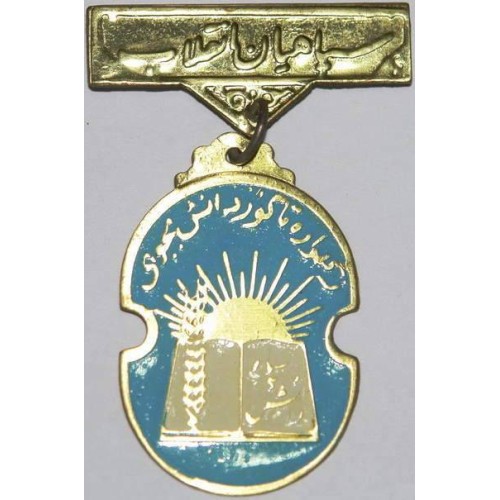- On sale!



Iran Shah Era Literacy Corps Sepah Danesh Breast Medal Badge
During Mehregan celebrations, the Iranian Minister of Culture announced foundation of Sepah Danesh on Oct, 14, 1962. Sepah Danesh was a special corps within the Iranian Army that consisted of soldiers doing their obligatory military service with a high school diploma. The main directive of Sepah Danesh was teaching illiterate people reading and writing.
The idea of forming Sepah Danesh was part of countrywide infrastructural reforms called the White Revolution. In 1962, %68 of the Iranian population lived in suburb; mostly small villages with no schools at all where illiteracy reached %95. The primary draft was approved by the Cabinet of Ministers headed by Asadollah Alam on Oct, 26, 1962. Detailed outlines of the Sepah Danesh project were concluded after consulting experts from the Ministry of War on Dec, 3, 1962. Members of the Sepah Danesh underwent a four months training at the Ministry of Education and were graduated as sergeant teachers before being deployed to their location of duty.
Until 1979 when the program was abolished, 18 groups of male and female soldiers whose number reached 100,000 teachers participated in the Sepah Danesh program. Some of them continued their career as teachers, instructors, trainers, etc. The outcome of the project was remarkable; 638,000 children and 262,000 adults were able to read and write during the first five years.
Mohammad Reza Shah Pahlavi campaigned on the White Revolution reforms to modernize the country however; some of these top-down directives did not find enough popular support although they were good in essence. Free eight years basic education, free nutrition program for toddlers under 2 years of age and children at primary schools became part of the Iranian educational system.
The fight with illiteracy did not stop after the Pahlavi monarchy was toppled by the Iranian Revolution of 1979. The Literacy Movement Organization of Iran was founded and succeeded in eliminating illiteracy among Iranians to a rate of %15.4 in 30 years which a great achievement acknowledged and awarded by UNESCO.